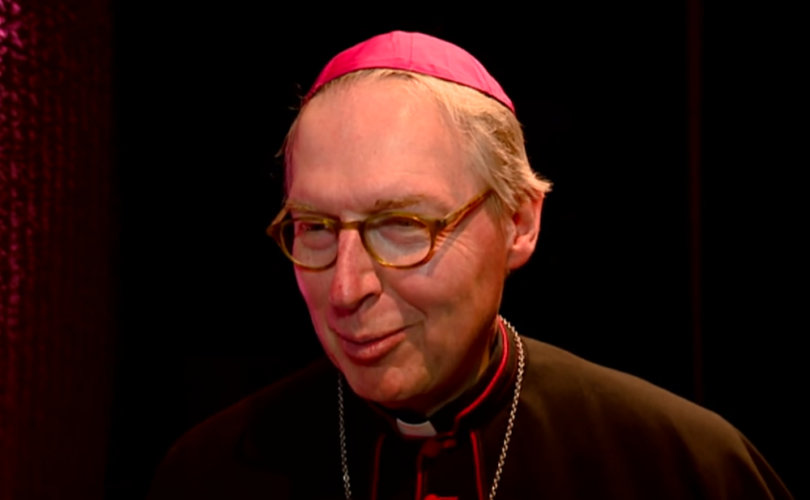Analysis
May 10, 2019 (LifeSiteNews) — Father Marc Massaer will be leaving his present parish in the diocese of ’s-Hertogenbosch, Netherlands, by the 1st of July. His removal is seen by many as a consequence of a strongly worded sermon he gave last December 26, speaking out against gender ideology and same-sex unions. Fr Massaer has published the news of his departure himself on his parish website on May 7, explaining that he has accepted Bishop de Korte’s suggestion that he leave Sint-Christoffel in West Maas en Waal on short notice. His new destination is as yet unknown.
While the priest himself has not underscored the link between his removal and his “controversial” homily (from the Dutch mainstream point of view), it is certain that he has gone through a period of confrontation with his parishioners, the Catholic members of eight former parishes he has led alone for the last eight years when a “super-parish” was formed, due to a dearth of priests and faithful in the formerly heavily Catholic south half of the Netherlands.
Hostilities were opened following the “Second Day of Christmas,” as it is called in Holland: a public holiday when many nominal Catholics who seldom go to church are wont to join Mass. Fr Massaer was celebrating in one of “his” eight parish churches, in Walen.
In this case, the daughter of a local choir member had come back to her home town for Christmas and joined Mass on the 26th. Ceciel Kalkers was shocked to hear the priest condemning “the indoctrination of gender ideology.” He said it “is radically opposed to the order of creation, and it promotes that what is not Catholic.” “This is a boomerang that will head back towards humanity,” he said, with all its “negative consequences,” she wrote two weeks later in an open letter to the local newspaper, De Maas en Waler.
She added another quote from the sermon from memory: “Only ‘holy families’ (man-woman-child) could bring peace and harmony.”
Her letter went on to speak of her “sadness,” thinking about “two good homo friends, a homo-couple with a newborn child.” “I hardly know anyone nicer. Weren’t these people welcome?” she said. And so her text went on, deploring the priest’s tone, his “condemnations,” his lack of “inclusion.”
Kalkers tried to speak to Massaer in the sacristy, but he had already left. The following day, she called him over the telephone, and was again shocked to hear that he was standing by his words. “People should start thinking, because they have fallen asleep,” he said, according to Kalkers.
Challenged about the “hurt” such words could cause to homosexuals, she said Fr Massaer added: “A man with a man is no lifestyle. We can’t make wrong things right just by talking. As a Church, we have a right to say what is right and what is wrong. Every human being stands before a choice, and I want them to think about that.”
“So orientation is a choice, according to Fr Massaer,” angrily wrote Ceciel Kalkers. She was even more indignant when she heard him add: “You’re really going against the order of creation and then you’re just sinning. Sins don’t fit with the Christian lifestyle. I condemn what is wrong.”
Shortly after this letter was published, the governing board of the parish of St. Christopher reached out to the diocese of ’s-Hertogenbosch (Den Bosch), whose bishop, Gerard de Korte, is known for his openness to the “LGBT community,” having even accepted to open his cathedral for the local “Pink pride” a few years back before being forced to back down.
According to the regional press, the board’s move was dictated by anger at the “gay-unfriendly” sermon of Marc Massaer, although the no details were given. Its vice president did tell De Gelderlander that the board was “not happy with the impact of the homily.”
The newspaper compared Massaer’s words with the Nashville statement condemning homosexual acts. At the time in the Netherlands, the statement was being picked up and signed by local evangelicals, amid furious media reaction. Some of them even received death threats at the time.
De Gelderlander wrote on May 7 that Massaer’s sermon had triggered “a storm of outrage, also among parishioners and volunteers.” Now Massaer is being moved to other pastures.
Talks took place between the parish governing board and the diocese, according to the newspaper: “It is not clear whether Massaer’s departure is a result of those talks. No one at the diocese or in the parish is prepared to answer requests for comment.”
Even if his new nomination was on the cards, reactions to his sermon are sufficient to show how difficult it is in a deeply paganized country such as the Netherlands to proclaim the full Catholic truth.
Local media noted that Massaer “keeps himself strictly to church rules.” “Last summer he banned a nonreligious choir from singing at the funeral of a parishioner,” noted De Gelderlander. But even that liberal daily was obliged to acknowledge that under Massaer’s guidance, not one of the eight churches of the joint parish of West Maas en Waal has been shut down.
Facebook comments called the priest an “Inquisitor” and a “freak.”
That is how upholders of traditional Church teaching are now seen in secularized Holland.

